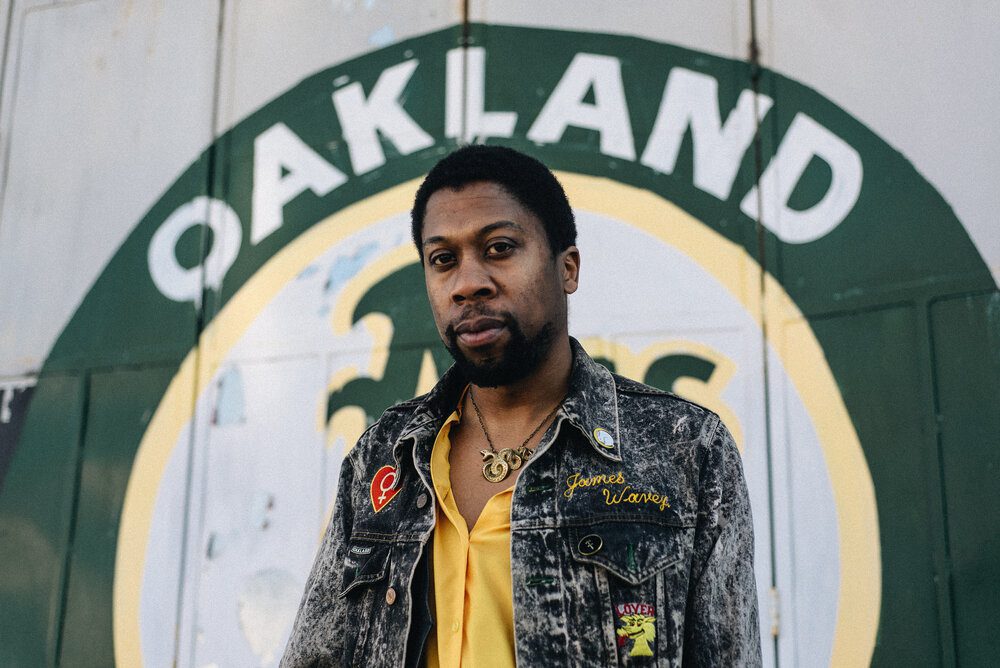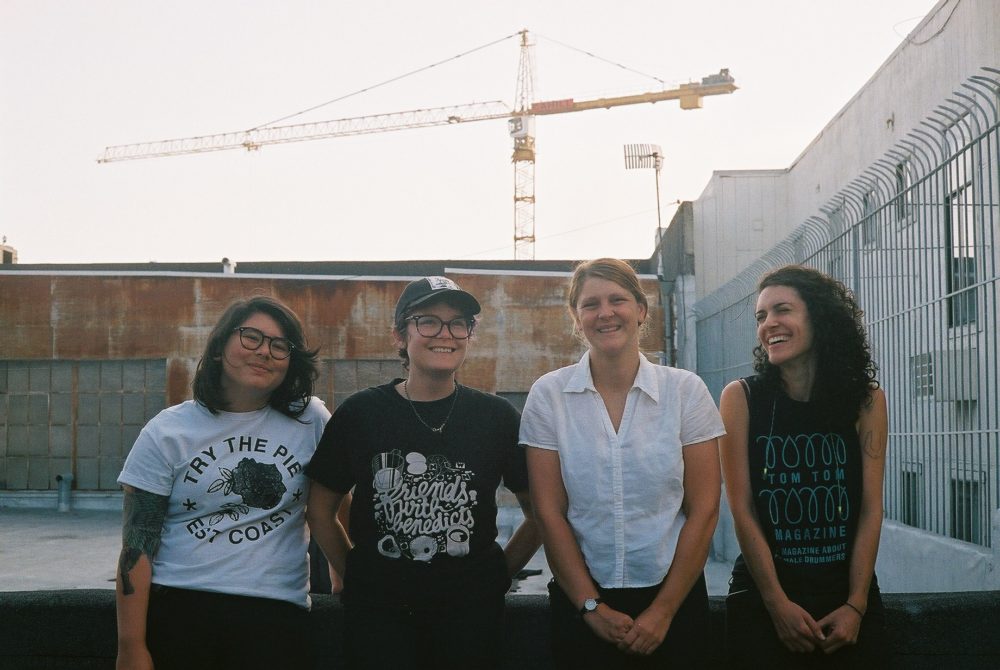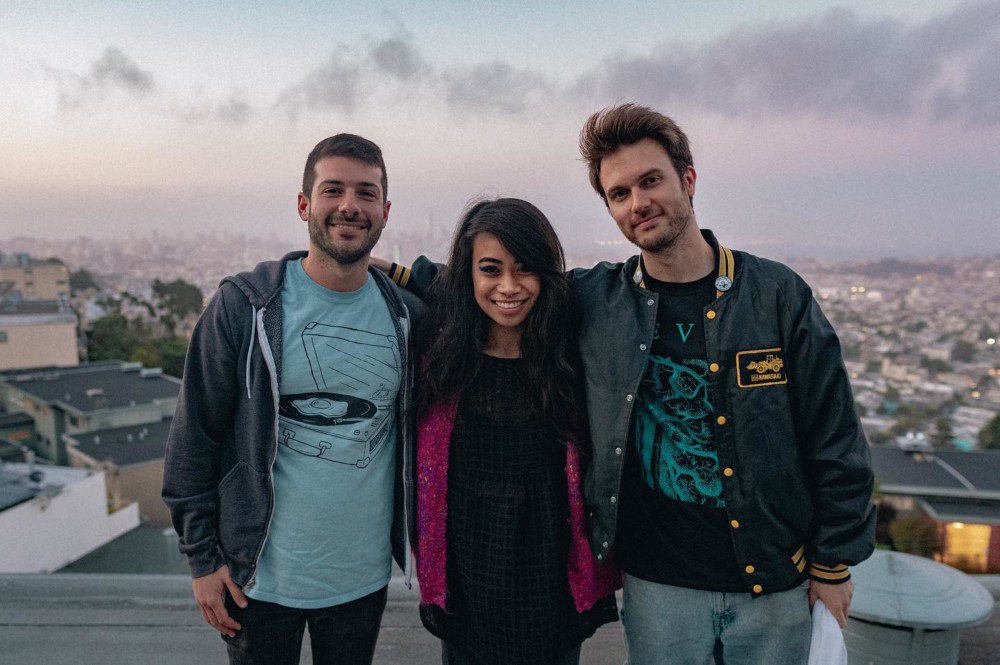

Babe, the new album by James Wavey/Alleyes Manifest, is a worn patchwork quilt come to life in ten warm, layered tracks.
“Love songs for listeners” is how Oakland’s Michael Bridgmon (Alleyes is his producer name, while James Wavey is his performance persona) describes it on Bandcamp. This is interesting phrasing; does this mean these songs are for music lovers — the “listeners” who comb through errant playlists to find their next obsession — or are these songs for the listeners of others, those precious few who always show up, sit down, and notice?
There is a lot to notice on this album. It’s a quick listen, but there are so many threads of influences and textures that it feels more substantial. There are two interludes — “Sunrise” and “Sunset” — both of which sound like hearing a radio blasting from an adjacent room, complete with echoes and crackles. I wish they were a bit longer and more connected to the songs they separate, as they do interrupt the flow of the LP a bit, but it’s always been my personal preference that album transitions sound seamless, interlude or not.
I assumed the audio on the two interludes were taken from samples, but it’s just as likely they were carefully designed pastiche tracks. Bridgmon’s main influences seem to be ’60s and ’70s soul and rock. The album cover certainly looks straight out of the ’60s — it literally says “stereo” in minute text below Bridgmon’s embroidered white collar — but some of the riffs hit a little harder and crunchier than those of the ’60s, like the excellent guitar that forms the backbone of “Cold Sweats.” The song starts with a very old-school soul lament (“cold sweats/since you’ve been away”) but soon transitions to a slow rap verse that manages to pull the sound out of last century with the power of Bridgmon’s vocal inflections. With a different beat, the verse could have been the moodiest track on a modern, rap-only album. It’s a good, well-balanced mix, and the LP sounds like a true conflation of genres. Bridgmon is by no means attempting to hide his commitment to soul and psychedelic rock here, but what works is that he also isn’t attempting to recreate it to the point that it becomes boring tunnel-vision. Even the simple-but-effective “Codependent” still has enough subtle effects to make it sound modern.
Opener “Anything Goes” is another great example of the balance Bridgmon achieves on Babe, its smooth raps stitched together with some truly sweet, almost reverent lyrics about his person of interest: “bein’ around you so spiritual/feel like I’m floatin’ in the Sistine Chapel on a cloud.” “Shoot Your Shot (Ghost)” is another starry-eyed track, albeit one where the various eras of influence do feel a bit disjointed, the raps slightly less seamless than those on some of the other tracks, especially during the repetitive chorus. However, it still works on the basis of the lyrics alone (“flowers won’t do/hope that one day we’ll tie the knot together/cold? Here’s my sweater”), which create a dreamy, lived-in atmosphere even when love may be the last thing on the listener’s mind.
The album closes out on the high-energy “Pillow Talk” and “Smooth Tiger,” the former of which feels almost like another interlude at a quick minute and a half. “Smooth Tiger” has a funky vibe and would make a killer track for a title sequence in a pulp film. Bridgmon is having fun here — as I believe he is the whole time — but the additional theatricality is really what was needed to end the album with enough punch to make you ready for another go round.
Bridgmon has long straddled multiple genres. Recently, Bridgmon re-released his 2018 James Wavey LP, Otoño, on vinyl. Even two years after the fact, this seems a relevant move for three reasons; firstly, the timeless quality of the work welcomes new chances at old formats. Secondly, vinyl has dragged itself almost fully from the trenches in the last year, making even 7” single releases by major pop artists such as Five Seconds of Summer and Taylor Swift seem necessary rather than niche. And finally, some of the themes of Onoño are still distressingly relevant, as can be seen in “Soul Music,” which is more about police brutality than anything, thanks to this central line: “know my pigment’s the future/keep your revolution/people wonder why we get high/argue that ain’t the solution/dealin’ with PTSD cause we saw cops shootin’.” In fact, many aspects of the album touch on things that have come up in the current national public discourse on race: personal responsibility; relationships with sexuality and religion (on “Christian Guilt”); the singer’s up/down relationship with self-worth and black masculinity.
The latter assertion comes from the newly released video for Otoño track “Photogenic,” where Bridgmon hams it up with his frequent collaborator Bryson Wallace in a black and white shoot. Both men occupy the limited-aspect ratio space very differently. Wallace, while filmed in black and white, maintains a clear connection with the present due to his choices in dress and mannerism, and even his style of rapping, which takes up the first half of the song. When Wavey comes in, he’s in full Jimi Hendrix regalia, at one point literally lying on the floor on a pile of women’s intimates, staring directly at the camera as he absently strums an electric guitar. Despite differences in aesthetic, the two friends tie it all together at the end, clasping hands and laughing while wearing oversized t-shirts airbrushed with each other’s faces. It’s a celebration of friendship, yes, but also one of claiming space and declaring self-worth, even if you don’t fully believe it — the embodiment of a fake it till you make it ethos, if you will.
Both Babe and Otoño manage many feats, their greatest perhaps that they allow their creator to wend his way through his many personas with ease, donning and shedding different names as though he’s making his way through a coat rack at the thrift store. But it’s not coming from some inability to commit; there is clearly something about these personas, especially James Wavey and his flamboyant romanticism, that put Bridgmon at ease, at least enough for him to rake through the threads of his life and find what needs to be drawn to the surface. Sometimes distance is what’s needed to create good art — and sometimes that distance means allowing yourself to be flamboyant and romantic, especially when the greater world frequently insists that the only way to make it through is to be the opposite.
Follow Alleyes Manifest on Facebook for ongoing updates.




